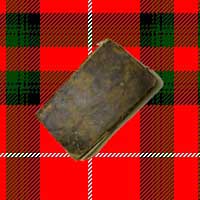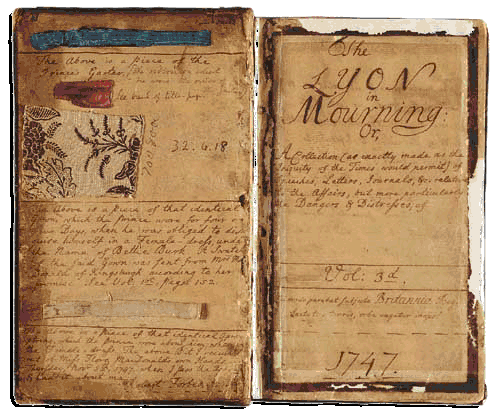
Ascanius; or, the Young Adventurer
Bestselling book of the 18th and 19th centuries
home
Rev. Robert Forbes A.M. Bishop of Ross and Caithness |
|
PART. VIII.—Jacobite Memoirs of the Rebellion of 1745. Edited
from the Right Reverend Robert Forbes, A.M., Bishop of the Scottish Episcopal Church of Ross and Caithness, by Robert Chambers, Author of "Traditions of Edinburgh,"
(Volume
II) &c. London: Longman and Co. and
Edinburgh: Chambers. 1834. This accident, which the zealous presbyter deeply bewailed as
the means of preventing him from kissing the hand of the regent,
saved him from the severer penalties which were inflicted upon
those who were actually engaged in the insurrection; and hence
it appears that, when tranquillity was restored, the conscientious
Jacobite returned into the bosom of his charge at Leith, to mourn
over the disappointment of his hopes and the loss of many friends,
as well as to record their exploits and vindicate their characters.
He steadily prosecuted his design of collecting, from the mouths
and pens of the survivors of the late enterprise, such narratives
and anecdotes as they could give from their own knowledge respecting
that extraordinary incident. His papers, we are told,
whether contributed in writing, or taken by himself from oral
communication, he regularly transcribed upon octavo sheets,
which in the end formed volumes; and nothing, it is added, can
exceed the neatness, distinctness, and accuracy with which the
whole task is performed. He took care, in particular, to see
most of the individuals who had been apprehended for their concern
in the prince's escape, and carried prisoners to London, an
opportunity being generally afforded by their passing through
Edinburgh, on their way back to the Highlands. apprehended by the civil power and thrown into prison, where they were detained until after the suppression of the unfortunate rising accomplished by the victory gained at Culloden.* " In a letter dated 9th April, 1743,
On the 9th of April, 1743, Gask
had a letter from Mr. Forbes, an Episcopalian clergyman,
who long afterwards became a constant correspondent
on the matter nearest the hearts of the Oliphants.
His sprightly style in later letters reminds us of the
French or Irish priest of the old school. Veteran plotter
that he is, he never signs his name to a single letter he
writes. His allusions to the King over the water are
easily seen. But fit it is, that our Cup of sweets be dash'd with some drops of Bitters, to prevent an Excess of rejoicing, & to heighten our Relish for Objects of greater value & real Steadiness. The worthy Nidsdale, Sr
Thomas Shirradane, (Preceptor to the two lovely
Branches) & a Gentleman of the Bed-chamber, whose
name I know not, are dead. The Death of Shirradane,
in particular, must affect Æneas much, for he was a
great & universal Scholar, without any mixture of the
Pedant, which adorn'd him with the finish'd Character
of the fine accomplish'd Gentleman. This Character of
him I had more than once from one, who was intimately
acquainted with him. My best wishes attend the
Family of Gask. |
